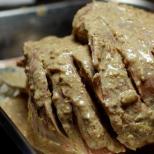Regional Clinical Hospital, Kharkov. Kharkov Regional Clinical Hospital Trinkler Regional Hospital
Kharkov Regional Clinical Hospital is a multidisciplinary medical organization that serves primarily residents of the region.
The main objectives of the regional clinical hospital are to provide specialized, highly qualified tertiary level medical care in the inpatient departments of the hospital with the involvement of the medical university teaching staff in the treatment and diagnostic process, the development of specialized advisory medical care in the clinic, the provision of planned and emergency advisory medical care, as well as organizational - methodological assistance to colleagues from medical and preventive institutions in the region, preparation and training of medical personnel.
Part Kharkov Regional Clinical Hospital includes a consultative clinic for 480 visits, 25 specialized inpatient departments with 860 beds, a modern set of diagnostic departments: a centralized multidisciplinary laboratory, an X-ray department, X-ray radiology, radiation diagnostics, ultrasound, endoscopic, radionuclide, functional diagnostics. There is a laboratory for ocular prosthetics. In addition, there are physiotherapy departments, pathology departments, and a pharmacy. On the basis of the departments, the work of specialized children's beds is organized: 10 gynecological, 5 neurosurgical.
Hospital departments:
- Department of Radiation Diagnostics
- Department of Ultrasound Diagnostics
- Endoscopy Department
- Department of Radionuclide Diagnostics
- Department of functional diagnostics
- Centralized multidisciplinary clinical diagnostic laboratory
- X-ray department
- Outpatient department
- Reception and diagnostic department
- Gynecological department
- Department of Pregnancy Pathology
- Maternity ward
- Newborn department
- Department of Anesthesiology
- Intensive care unit with beds for general and acute poisoning (toxicological profile)
- Intensive care unit for extracorporeal detoxification methods and hyperbaric oxygenation
- Neurosurgical Department
- Department of Cardiovascular Surgery
- Department of Interventional Radiology
- Surgical department No. 1
- Department of purulent-septic surgery
- Proctology department
- Department of Traumatology and Orthopedics
- Dental department
- Otolaryngological department
- Ophthalmology department for adults
- Ophthalmology department for children
- Laboratory of individual ocular prosthetics
- Rheumatology department
- Endocrinology Department
- Pulmonology department
- Gastroenterology department
- Cardiology Department
- Department of Allergology
- Neurological Department
- Department of rehabilitation treatment
- Physiotherapeutic department
- Center for Emergency Medical Care and Disaster Medicine
Hospitals and clinics 1st Maternity hospital 1st Children's clinic 1st Children's dental clinic 1st Clinical hospital 1st Regional children's clinical hospital 1st Dental clinic 10th City clinic 11th City clinical hospital 11th City clinic 12th City children's clinic 13th City children's clinic 13th City clinical hospital 14th City children's clinic 14th City clinical hospital named after. prof. L. L. Girshman 15th City Children's Clinic 16th City Children's Clinical Hospital 16th City Children's Clinic 17th City Clinical Hospital "Stroitel" 17th Clinical Multidisciplinary Hospital 18th City Multidisciplinary Hospital 18th City Clinic 19th City Clinic 19th Children's Clinical Hospital 2nd Trauma Department of the Kharkov City Clinical Hospital of Emergency and Emergency Medical Care named after. prof. O.I. Meshchaninova 2nd City Children's Clinic 2nd City Clinical Hospital 2nd Dental Clinic 20th City Clinic 21st City Clinic 22nd City Clinic 23rd City Children's Clinic 24th City Children's Clinical Hospital 25th City clinical multidisciplinary hospital 26th City Clinic 27th City Clinical Hospital 28th City Hospital 3rd Maternity Hospital 3rd City Hospital 3rd City Clinic 3rd Dental Clinic 3rd Kharkov Regional Clinical Psychiatric Hospital 30th City otolaryngological clinical hospital 31st City Clinical Hospital 4th City Children's Clinic 4th Dental Clinic 5th Specialized City Clinical Maternity Hospital 5th City Children's Hospital 5th City Clinic 5th Dental Clinic 6th City Maternity Hospital house 6th City Clinic 6th Dental Clinic 7th City Clinical Maternity Hospital 7th City Children's Clinic 7th City Clinical Hospital 7th Dental Clinic 8th City Clinical Hospital 8th City Clinic 8th Dental polyclinic 9th City Clinical Narcological Hospital 9th City Polyclinic Obstetrics and Gynecology Department of the hospital st. Kharkov Southern Railway City Clinical Hospital of Emergency and Emergency Medical Care named after. prof. A. I. Meshchaninova City dairy factory-kitchen for baby food City clinical dermatovenerological dispensary No. 5 City clinical anti-tuberculosis dispensary No. 1 City clinical maternity hospital with a neonatology hospital City dermatovenerological dispensary No. 2 City psychoneurological dispensary No. 3 City maternity hospital No. 2 them. M. Kh. Gelferikha State Institution "Institute of General and Emergency Surgery of the National Academy of Medical Sciences of Ukraine" Children's Department of the hospital st. Kharkov Southern Railway Dispensary dermatovenerological department of polyclinic No. 3 Dispensary anti-tuberculosis department No. 2 Dispensary anti-tuberculosis department No. 3 Dispensary anti-tuberculosis department No. 5 Road clinical hospital st. Kharkov Southern Railway Road phthisiopulmonological dispensary Southern Railway Dermatovenerological dispensary No. 1 Dermatovenerological dispensary No. 13 Medical unit of JSC "KhTZ" Regional clinical hospital Regional medical and physical education dispensary Regional clinical oncological dispensary Regional drug treatment dispensary Regional anti-tuberculosis dispensary No. 1 Regional anti-tuberculosis dispensary No. 3 Regional anti-tuberculosis dispensary No. 4 Regional specialized dispensary for radiation protection of the population Transfusiology department of the hospital st. Kharkov Southern Railway Polyclinic of the Main Department of the Ministry of Internal Affairs of Ukraine in the Kharkov region Psychoneurological dispensary No. 16 Specialized medical and sanitary unit No. 13 of the Ministry of Health of Ukraine Specialized medical unit of the KhNMU Nodal hospital st. Kharkov South Railway Kharkov Regional Children's Infectious Clinical Hospital Kharkov Regional Children's Clinical Hospital Kharkov Regional Clinical Infectious Hospital Kharkov Regional Clinical Trauma Hospital Kharkov Regional Psychiatric Hospital Kharkov Regional Dental Clinic Kharkov Regional Student Hospital Kharkov Regional Tuberculosis Hospital No. 1 Kharkov Regional Clinical Dermatovenerological Dispensary No. 1 Kharkov Regional Psychoneurological Dispensary Kharkov Regional Center for Palliative Medicine "HOSPICE" Kharkov Regional Blood Service Center Central Clinical Hospital State Enterprise "Ukrzaliznytsia"
Regional Clinic Hospital is a multidisciplinary medical institution that serves residents of Kharkov and the Kharkov region.
The current name of the hospital is KUZ "Regional Clinical Hospital - Center for Emergency Medical Care and Disaster Medicine".
The hospital annually performs more than 11,000 surgical interventions, including almost 3,500 performed in the surgical unit of the main nine-story medical building of the institution (these are operations of increased complexity).
The main tasks of the Regional Clinical Hospital:
- Providing specialized, highly qualified third-level care in the inpatient and outpatient departments of the hospital with the involvement of the teaching staff of the Kharkov National Medical University in the diagnostic and treatment process;
- Providing planned and emergency advisory medical care, as well as organizational and methodological assistance to colleagues from medical institutions in the districts of the Kharkov region;
- Training and retraining of medical personnel.
Structure of the Regional Clinical Hospital:
- Advisory clinic for 480 visits;
- Reception department;
- 25 specialized inpatient departments with 860 beds;
- Centralized multidisciplinary laboratory;
- X-ray Department;
- Department of X-ray and radiology diagnostics;
- Departments of ultrasound, endoscopic, radionuclide, functional diagnostics;
- Laboratory of ocular prosthetics;
- Department of Physiotherapy;
- Pathology Department;
- Pharmacy.
The work of specialized children's beds is organized on the basis of the hospital departments: 10 gynecological, 5 neurosurgical.
Department of Ultrasound Diagnostics equipped with modern ultrasound equipment from Siemens (Germany) and General Electric (USA) with Doppler units. The department conducts studies of the gastrointestinal tract, genitourinary system, female genital organs, thyroid gland and heart, mammary glands, osteoarticular apparatus, Doppler examination of the fetal heart in pregnant women. A study of peripheral blood flow in the vessels of the upper and lower extremities is carried out.
Intensive care unit with beds for general and acute poisoning(toxicological profile) is equipped with modern monitoring and anesthesia-respiratory equipment, allowing intensive therapy for seriously ill patients to be carried out at a high level. The structure of the department includes general intensive care beds, toxicological intensive care beds, an express laboratory, a chemical-toxicological laboratory, and a mobile resuscitation team.
Intensive care unit for extracorporeal detoxification and hyperbaric oxygenation methods provides urgent and planned medical care to patients with acute and chronic pathology, for which modern techniques of hyperbaric oxygenation, membrane plasmapheresis and hemodialysis are used.
Neurosurgical Department carries out corrective surgical interventions for patients with various neurological disorders: acute craniocerebral, spinal cord injuries and their consequences, hemorrhagic strokes, tumors of the brain and spinal cord, epilepsy, purulent-inflammatory complications of the brain, hydrocephalus, trigeminal neuralgia, etc.
Department of Cardiovascular Surgery provides round-the-clock urgent care for acute arterial and venous thrombosis, heart attacks, vascular crises, cardiac arrhythmias, and thromboembolic complications. The department performs the full range of reconstructive surgical interventions on arteries of any location for occlusions, stenoses, aneurysms, ruptures of any origin, using the most modern synthetic materials and technologies. The department operates the Regional Phlebological Center and the Center for Interventional Arrhythmology.
In surgical department No. 1 Surgical treatment is carried out for patients with diseases of the neck and thyroid gland, lungs and pleura, stomach and duodenum, liver, biliary tract, pancreas, and mammary glands. Surgeries are performed on the skin and subcutaneous tissue. Traditional and modern methods of surgical interventions (organ-preserving, resection, minimally invasive endoscopic, plastic, alloplasty using endoprostheses, etc.) are performed at a high level. The department operates regional centers for hernia surgery, endocrine surgery, and precancerous diseases.
Department of purulent-septic surgery treats patients with acute pancreatitis, complicated by destructive forms of acute appendicitis and cholecystitis, diabetic and sclerotic gangrene of the extremities, abdominal abscesses, intestinal fistulas, postoperative purulent-septic complications, phlegmon of the extremities and torso, purulent diseases in patients with diabetes, etc. In work The department uses modern methods of surgical and conservative treatment with immunocorrection of the patients' condition.
Proctology department specializes in the treatment of patients with thrombosis of hemorrhoids, acute anal fissures, colonic bleeding, foreign bodies in the rectum, colonic obstruction, anal genital warts, inflammatory bowel diseases, ulcerative colitis, complicated hemorrhoids, etc. The department uses modern methods of diagnosis, treatment and rehabilitation of patients, including medical and social rehabilitation and reconstructive surgery.
Department of Traumatology and Orthopedics provides orthopedic treatment of degenerative-dystrophic diseases of the joints of various etiologies. For the treatment of diseases of large joints in late stages, hip fractures, the method of endoprosthetics is widely used. To provide traumatological care to patients with skeletal trauma, both conservative and surgical methods are used - all types of osteosynthesis of skeletal bones. For diseases and injuries of the joints, minimally invasive surgical treatment methods are used - arthroscopy, corrective osteotomies, chondroplasty and others. We provide assistance to patients with various injuries and diseases of the spine. The department performs tendon plastic surgery, musculoskeletal plastic surgery, and aesthetic surgery.
Dental department regional hospital provides treatment for purulent-inflammatory diseases of the maxillofacial area, acute injuries, obsolete fractures and repeated deformations of this area, neoplasms of the maxillofacial area and parts of the neck, odontogenic sinusitis, inflammation around the ear and submandibular salivary glands, retention and dystopia of teeth, congenital anomalies in the development of the upper and lower jaw, gunshot wounds in this area. The department uses methods of surgical and reconstructive treatment of injuries and defects of the craniomaxillofacial region using autologous tissues, titanium compositions and titanium miniplates. Mastered the operation of TMJ endoprosthetics.
Otolaryngology department carries out sanitizing and reconstructive operations on the middle ear, treats and diagnoses inflammatory and allergic diseases of the nose, plastic and cosmetic surgeries on the ENT organs. The department also uses non-drug methods for treating diseases of the ENT organs - laser knife, cryogenic treatment. The department operates a Center for Microsurgery and Plastic-Reconstructive Surgery of ENT Organs.
Ophthalmology department for adults uses modern surgical techniques in the treatment of age-related cataracts and glaucoma. Methods for surgical treatment of dystrophic and vascular diseases of the retina have been introduced. The department treats all types of cataracts, all types of glaucoma, eye injuries and burns, phlegmons and abscesses of the orbit and adnexa of the eye, keratitis, complicated forms of myopia, degenerative diseases of the retina, neoplasms of the orbit, ptosis, etc.
Ophthalmology department for children provides treatment for all types of amblyopia, strabismus, inflammatory and degenerative diseases, eye tumors, surgical treatment of cataracts, glaucoma, all types of emergency care for injuries of the eye and its appendages.
Rheumatology department uses both traditional medications and physiotherapy, as well as new extracorporeal methods of treating patients with severe acute rheumatic fever and chronic rheumatic heart disease, diffuse connective tissue diseases (systemic lupus erythematosus, scleroderma and others), pathology of the musculoskeletal system (rheumatoid arthritis, osteoarthritis , gout), systemic vasculitis, and the like.
Endocrinology Department provides treatment to patients with endocrine pathologies: diabetes mellitus, diseases of the thyroid gland, adrenal glands, etc. The department operates a podiatric center - the “Diabetic Foot” office.
Pulmonology Department specializes in the treatment of patients with pneumonia, bronchial asthma during exacerbation with pulmonary insufficiency, chronic purulent lung diseases, bronchospastic syndrome of unknown etiology, hemoptysis, congenital pathology of the bronchopulmonary system. The computer spirography method is used to diagnose diseases.
Gastroenterology Department is a Regional Center for the diagnosis and treatment of patients with pathology of the digestive organs, the base of the Department of Faculty Therapy of KhNMU. Diagnosis of diseases includes esophagogastroduadenoscopy (EGD), ultrasound diagnostics, CT, X-ray studies of the gastrointestinal tract, colonoscopy and sigmoidoscopy, capsule video endoscopy. In the probe room, gastric contents are examined, duodenal intubation, and intragastric pH-metry are performed. For the treatment of gastroenterological diseases, in addition to modern medications, the technique of colon hydrotherapy, therapeutic microenemas, hyperbaric oxygenation, physiotherapy and balneotherapy are used.
Cardiology department provides assistance to patients with hypertension, coronary heart disease, various heart rhythm and conduction disorders, and heart failure. The department performs all necessary cardiological studies: ECG, EchoCG, ECG monitoring, blood pressure monitoring, stress tests, etc.
Department of Allergology, on the basis of which the Regional Center for Allergology and Clinical Immunology was created, diagnoses and treats bronchial asthma, acute and chronic urticaria, allergic dermatitis, allergic rhinitis, Quincke's edema, food and drug allergies, etc. Along with modern methods of drug treatment, specific immunotherapy is carried out with identified allergens. Non-drug methods for treating allergic diseases have been introduced.
Department of Neurology provides highly qualified specialized medical care to patients with diseases of the nervous system: cerebrovascular accidents, epilepsy, diseases of the peripheral nervous system, autonomic disorders, etc. The department offers services for neurorehabilitation, rehabilitation of patients after traumatic and non-traumatic brain injuries, including after a stroke. The department performs all necessary studies: CT and MRI, electroencephalography, rheoencephalography, echoencephaloscopy, Doppler sonography of cerebral vessels, biochemical studies.
Physiotherapeutic department KUZ "Regional Clinical Hospital - Center for Emergency Medical Care and Disaster Medicine" provides assistance to patients from all clinical departments of the hospital. The range of physiotherapeutic methods and treatment methods offered by the physiotherapy department today includes: electrotherapy, magnetotherapy, laser therapy, hydrotherapy, peloid therapy (mud treatment), reflexology, light therapy, vibroacoustic, ultrasound, inhalation therapy, physical therapy, massage.
Diagnostic center in a 5-story building.
Departments of the diagnostic center:
- Computed Tomography Department(1st floor) equipped with CT, MRI, mammograph, digital X-ray unit;
- Department of Interventional Diagnostics and Endovascular Surgery(2nd floor) is equipped with a modern angioseriograph, allowing endovascular operations for diseases of the cardiovascular system and cerebral vessels;
- Department of Functional Diagnostics(3rd, 4th floors) is equipped with modern expert-class ultrasound machines with Dopplerography, EEG, ECG with the possibility of 24-hour Holter monitoring;
- Department of Endoscopic Diagnostics(5th floor) is equipped with modern endoscopic units and autonomous endoscopic devices that allow you to diagnose diseases of the gastrointestinal tract and bronchopulmonary system.
The hospital has a 24-hour CT scanner. In total, the hospital constantly operates 3 X-ray computed tomographs, a magnetic resonance imaging scanner, and a digital angioseriograph.
The Department of Neurosurgery performs stereotactic biopsy of deep-seated brain tumors under the control of a spiral computed tomograph.
An ultra-modern multi-slice (128 slices) X-ray computed tomograph was put into operation. A study using this tomograph allows you to visualize the vascular system (non-invasive angiography) of the brain, heart muscle (coronary angiography) and other internal organs. The tomograph also makes it possible to diagnose tumors and metastases of any location (brain, chest organs, abdominal cavity and pelvis, bones and soft tissues of the extremities with bolus contrast) with a very high degree of reliability.
The centralized sterilization department of the hospital is equipped with modern climatic air conditioning systems with supply and exhaust ventilation, bactericidal irradiators, which provides optimal conditions for the sterilization of medical devices and dressings.
Today, the Regional Clinical Hospital is the base of 13 departments of the Kharkov National Medical University, namely neurosurgery, faculty surgery, maxillofacial surgery, propaedeutics of internal diseases, faculty therapy, obstetrics and gynecology, No. 2, ophthalmology, nervous diseases, otolaryngology, pathological anatomy , traumatology, radiology and radiology, anesthesiology and emergency conditions.
Historical reference:
The regional clinical hospital was founded by order of Emperor Alexander III in 1896 and had three clinics: therapeutic, obstetric-gynecological and ophthalmological with 96 beds.
In 1917-1918 The Neurology Clinic and the Children's Disease Clinic were opened.
In the post-war years, the hospital was restored and 7 clinics with 400 beds were established.
In 1977, construction began on a complex of new buildings: a clinic, a 9-story hospital building with 500 beds, a dormitory for hospital employees, a catering unit and a boarding house for patients with 320 beds.
In 2004, a 5-story building was built, where a modern pathological and anatomical department and a diagnostic center are located.
In 2017, a new Reception and Diagnostic Department for Emergency Medical Care and Intensive Care with 25 beds was opened.
Kharkov Regional Clinical Hospital is a multidisciplinary medical organization that serves primarily residents of the region.
The main objectives of the regional clinical hospital are to provide specialized, highly qualified tertiary level medical care in the inpatient departments of the hospital with the involvement of the medical university teaching staff in the treatment and diagnostic process, the development of specialized advisory medical care in the clinic, the provision of planned and emergency advisory medical care, as well as organizational - methodological assistance to colleagues from medical and preventive institutions in the region, preparation and training of medical personnel.
Part Kharkov Regional Clinical Hospital includes a consultative clinic for 480 visits, 25 specialized inpatient departments with 860 beds, a modern set of diagnostic departments: a centralized multidisciplinary laboratory, an X-ray department, X-ray radiology, radiation diagnostics, ultrasound, endoscopic, radionuclide, functional diagnostics. There is a laboratory for ocular prosthetics. In addition, there are physiotherapy departments, pathology departments, and a pharmacy. On the basis of the departments, the work of specialized children's beds is organized: 10 gynecological, 5 neurosurgical.
Hospital departments:
- Department of Radiation Diagnostics
- Department of Ultrasound Diagnostics
- Endoscopy Department
- Department of Radionuclide Diagnostics
- Department of functional diagnostics
- Centralized multidisciplinary clinical diagnostic laboratory
- X-ray department
- Outpatient department
- Reception and diagnostic department
- Gynecological department
- Department of Pregnancy Pathology
- Maternity ward
- Newborn department
- Department of Anesthesiology
- Intensive care unit with beds for general and acute poisoning (toxicological profile)
- Intensive care unit for extracorporeal detoxification methods and hyperbaric oxygenation
- Neurosurgical Department
- Department of Cardiovascular Surgery
- Department of Interventional Radiology
- Surgical department No. 1
- Department of purulent-septic surgery
- Proctology department
- Department of Traumatology and Orthopedics
- Dental department
- Otolaryngological department
- Ophthalmology department for adults
- Ophthalmology department for children
- Laboratory of individual ocular prosthetics
- Rheumatology department
- Endocrinology Department
- Pulmonology department
- Gastroenterology department
- Cardiology Department
- Department of Allergology
- Neurological Department
- Department of rehabilitation treatment
- Physiotherapeutic department
- Center for Emergency Medical Care and Disaster Medicine





